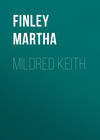Buch lesen: «Elsie's Vacation and After Events», Seite 5
CHAPTER VII
From Trenton Grandma Elsie, the captain, and their young charges went on to Princeton, where they received a most joyful welcome from Harold and Herbert Travilla, now spending their last year at the seminary.
Their mother had written to them of the intended visit, and all necessary arrangements had been made. Carriages were in waiting, and shortly after their arrival the whole party were on their way to the battleground, where the attention of the young people was drawn to the various points of interest, particularly the spot where fell General Mercer.
"The general's horse was wounded in the leg by a musket ball," explained Harold, in reply to a question from his little brother; "he dismounted, and was rallying his troops, when a British soldier felled him to the ground by a blow from a musket.
"He was supposed to be Washington. A shout, was raised, 'The rebel general is taken!' and at that others of the enemy rushed to the spot calling out, 'Call for quarter, you d – d rebel!'
"'I am no rebel!' Mercer answered indignantly, though half a dozen of their bayonets were at his breast; and instead of calling for quarter he continued to fight, striking at them with his sword till they bayoneted him and left him for dead.
"He was not dead, however, but mortally wounded.
"After the British had retreated he was carried to the house of Thomas Clark," continued Harold, pointing out the building as he spoke, "where he lingered in great pain till the 12th and then died."
"I'm glad it wasn't Washington," said Walter.
"Was Washington hurt at all, papa?" asked Grace.
"No, though exposed to the hottest fire he escaped without injury," replied the captain. "God our Heavenly Father preserved him for his great work – the salvation of our country. 'Man is immortal till his work is done' – and Washington's was not done till years afterward."
"Not even when the war was over; for he was our first president, I remember," said Lulu.
"Yes," replied her father, "and he did much for his country in that capacity.
"The night before this battle of Princeton he and his army were in a critical situation, the British being fully equal in numbers and their troops well disciplined, while about half of Washington's army was composed of raw militia – so that a general engagement the next day would be almost sure to result in defeat to the Americans.
"Washington called a council of war. It was he himself who proposed to withdraw from their present position – on the high ground upon the southern bank of the Assanpink – before dawn of the next morning, and, by a circuitous march to Princeton, get in the rear of the enemy, attack them at that place, and if successful march on to New Brunswick and take or destroy his stores there.
"The great difficulty in the way was that the ground was too soft, from a thaw, to make it safe and easy to move their forty pieces of cannon.
"But a kind Providence removed that hindrance, the weather suddenly becoming so extremely cold that in two hours or less the roads were hard enough for the work."
"As Lossing says," remarked Grandma Elsie, "'The great difficulty was overcome by a power mightier than that of man. Our fathers were fighting for God-given rights and it was by his help they at last succeeded.'"
"What's the rest of the story?" asked Walter. "How did Washington and his army slip away without the British seeing them? For I suppose they had sentinels awake and out."
"Washington had a number of camp fires lighted along his front," replied Harold, to whom the question seemed to be addressed, "making them of the fences near at hand. That made the British think he was encamped for the night, and Cornwallis, when some one urged him to make an attack that night, said he would certainly 'catch the fox in the morning.' The fox, of course, was Washington, but he didn't catch him. It was not till dawn he discovered that the fox had eluded him and slipped away, fleeing so silently that the British did not know in what direction he had gone till they heard the boom of the cannon in the fight here.
"Cornwallis thought it was thunder, but Sir William Erskine recognized it as what it was and exclaimed, 'To arms, General! Washington has outgeneraled us. Let us fly to the rescue at Princeton.'"
"How long did the battle last?" queried Walter.
"The fight right here lasted about fifteen minutes, but was very severe," replied his brother. "Then Washington pushed on to Princeton, and in a ravine near the college had another sharp fight with the Fifty-fifth British regiment."
"And whipped them too?"
"Yes; they were soon flying toward Brunswick, the Fortieth regiment going along with them.
"A part of a regiment was still in the college buildings, and Washington had some cannon placed in proper position, then began firing on them. One of the balls – it is said to have been the first – passed into the chapel and through the head of a portrait of George the Second that hung in a large frame on the wall. A few more shots were fired, and then the Princeton militia, and some other daring fellows, burst open a door of Nassau Hall and called upon the troops there to surrender, which they did promptly."
"And Cornwallis had not reached there yet?" Walter said interrogatively.
"No," returned Harold, "and when he did arrive he found that the battle was over, and Washington, with his victorious troops and prisoners, had already left the town and was in hot pursuit of the fleeing Fortieth and Fifty-fifth regiments."
"And our poor fellows so tired and cold!" sighed Eva.
"Yes," said the captain, "they had fought at Trenton on the 26th, after being up, probably, all night, getting across the river, had spent the next night in marching upon Princeton and the day in fighting; so that they must have been terribly fatigued even had they had the warm clothing and nourishing food they needed; but less than half of them had been able to procure any breakfast or dinner; and, as you all know, many of them were without shoes or stockings. Ah, how we should prize the liberty which was so dearly bought!"
"So to save his army," resumed Harold, "Washington refrained from an effort to seize the rich prize at New Brunswick, and let them rest that night and refresh themselves with food; then retired to his winter quarters at Morristown.
"Now, good people, if you are ready to retrace your steps, let us go back and look at the town souvenirs of the revolution; among them the portrait of Washington in the frame that used to hold that of George the Second."
Our friends made but a short stay at Princeton, leaving that evening, and the next day visited the scene of the battle of Monmouth. The captain gave a rapid sketch of the movements of the opposing armies, as he did so pointing out the various positions of the different corps, describing Lee's disgraceful conduct at the beginning of the fight, telling of the just indignation of Washington, his stern reproof, Lee's angry rejoinder, and then with what consummate skill and despatch his errors were repaired by the general-in-chief – the retreating, almost routed, troops rallied, and order brought out of confusion, and how fearlessly he exposed himself to the iron storm while giving his orders so that that patriot army, which had been so near destruction, within half an hour was drawn up in battle array and ready to meet the foe.
"It was a very hot day, wasn't it, papa?" asked Lulu.
"One of the hottest of the season," replied her father, "ninety-six degrees in the shade; and the sun slew his victims on both sides."
"Don't you think Lee was a traitor, Captain?" queried Evelyn.
"Either that or insane. I think it would have been a happy thing for America if both he and Gaines had remained in their own land. They did the American cause far more harm than good. Though I by no means accuse Gaines of treachery, but he was envious of Washington, and so desirous to supersede him that he was ready to sacrifice the cause to that end."
"I just wish he'd been sent back to England," said Walter. "But please tell us the rest about the battle, Brother Levis, won't you?"
The captain willingly complied.
"It was a dreadful battle," remarked Evelyn with a sigh, as his story came to a conclusion.
"Yes, one of the most hotly contested of the war," he assented, "and resulted in victory to the Americans in spite of Lee's repeated assertion that the 'attempt was madness.'
"All the other American generals did well, the country resounded with praises of Washington, and Congress passed a unanimous vote of thanks to him 'for his great and good conduct and victory.'"
"It was in this battle Captain Molly fought, wasn't it?" asked Rosie.
"Yes," the captain replied; and, noticing the eagerly inquiring looks of Grace and Walter, he went on to tell the story.
"Molly was the wife of a cannoneer who was firing one of the field-pieces, while she, disregarding the danger from the shots of the enemy, made frequent journeys to and from a spring near at hand, thus furnishing her husband with the means of slacking his thirst, which must have been great at such work in such weather.
"At length a shot from the enemy killed him, and an order was given to remove the cannon, as there was no one among the soldiers near who was capable of its management.
"But Molly, who had seen her husband fall, and heard the order, dropped her bucket, sprang to the cannon, seized the rammer, and, vowing that she would avenge his death, fired it with surprising skill, performing the duty probably as well as if she had belonged to the sterner sex.
"The next morning General Greene presented her – just as she was, all covered with dust and blood – to Washington, who gave her the commission of sergeant as a reward for her bravery; in addition to that he recommended her to Congress as worthy to have her name placed upon the list of those entitled to half-pay during life.
"The French officers so admired her bravery that they made her many presents. Lossing tells us that she would sometimes pass along their lines and get her cocked hat full of crowns. He also says the widow of General Hamilton told him she had often seen 'Captain Molly,' as she was called, and described her as a red-haired, freckle-faced young Irish woman, with a handsome piercing eye."
"Papa, did she wear a man's hat?" asked Grace.
"Yes, and also an artilleryman's coat over her woman's petticoats. She had done a brave deed about nine months before the battle of Monmouth, when Fort Clinton was taken by the British. She was there with her husband when the fort was attacked, and when the Americans retreated from the fort, and the enemy were scaling the ramparts, her husband dropped his match and fled, but Molly picked it up and fired the gun, then scampered off after him. That was the last gun fired in the fort by the Americans."
"And this battle of Monmouth was a great victory for us – for the Americans, I mean?" Walter said inquiringly.
"Yes, in spite of the shameful retreat of Lee and the unaccountable detention of Morgan and his brave riflemen, who were within sound of the fearful tumult of the battle and eager to take part in it, Morgan striding to and fro in an agony of suspense, and desire to participate in the struggle, yet unaccountably detained where he was."
"And that was some of that traitor Lee's doings, I suspect," exclaimed Lulu hotly. "Wasn't it, papa?"
"My dear child, I do not know," returned the captain, "but it seems altogether probable that if Morgan could have fallen, with his fresh troops, upon the weary ones of Sir Henry Clinton, toward the close of the day, the result might have been such a surrender as Burgoyne was forced to make at Saratoga.
"But as it was, while Washington and his weary troops slept that night, the general looking forward to certain victory in the morning, when he could again attack his country's foes with his own troops strengthened and refreshed by sleep, Sir Henry and his army stole silently away and hurried toward Sandy Hook."
"Did Washington chase him?" asked Walter.
"No," said the captain; "when he considered the start the British had, the weariness of his own troops, the excessive heat of the weather, and the deep sandy country, with but little water to be had, he thought it wiser not to make the attempt."
"Papa, was it near here that the British shot Mrs. Caldwell?" asked Lulu.
"No; that occurred in a place called Connecticut Farms, about four miles northwest of Elizabethtown, to which they – the Caldwells – had removed for greater safety.
"It was in June, 1780. The British under Clinton and Knyphausen crossed over to Elizabethtown and moved on toward Springfield. The Americans, under General Greene, were posted upon the Short Hills, a series of high ridges near Springfield, and came down to the plain to oppose the invasion of the British. I will not go into the details of the battle, but merely say that the British were finally repulsed, Greene being so advantageously posted by that time that he was anxious for an engagement, but Knyphausen, perceiving his own disadvantage, retreated, setting fire to the village of Connecticut Farms (now called Union) on his way.
"The people of the town fled when they perceived the approach of the British, but Mrs. Caldwell remained, and with her children and maid retired to a private apartment and engaged in prayer.
"Presently her maid, glancing from a window, exclaimed that a red-coated soldier had jumped over the fence and was coming toward the window.
"At that Mrs. Caldwell rose from the bed where she had been sitting, and at that moment the soldier raised his musket and deliberately fired at her through the window, sending two balls through her body, killing her instantly, so that she fell dead among her poor frightened children.
"It was with some difficulty that her body was saved from the fire which was consuming the town. It was dragged out into the street, and lay exposed there for some time – several hours – till some of her friends got leave to remove it to a house on the other side of the street.
"Her husband was at the Short Hills that night, and in great anxiety and distress about his family; the next day he went with a flag of truce to the village, found it in ruins, and his wife dead.
"That cold-blooded murder and wanton destruction of the peaceful little village aroused great indignation all over the land and turned many a Tory into a Whig."
"Did anybody ever find out who it was that killed her, papa?" asked Grace.
"The murderer is said to have been a man from the north of Ireland, named McDonald, who for some unknown reason had taken a violent dislike to Mr. Caldwell.
"But little more than a year afterward Mr. Caldwell himself was slain, in a very similar manner, but by an American soldier."
"An American, Brother Levis?" exclaimed Walter, in unfeigned surprise. "Did he do it intentionally?"
"The shooting was intentional, but whether meant to kill I cannot say," replied the captain; "the fellow who did it is said to have been a drunken Irishman. It happened at Elizabethtown, then in possession of the Americans. A sloop made weekly trips between that place and New York, where were the headquarters of the British army at that time – and frequently carried passengers with a flag, and also parcels.
"The Americans had a strong guard at a tavern near the shore, and one or two sentinels paced the causeway that extended across the marsh to the wharf.
"One day in November, 1781, the vessel came in with a lady on board who had permission to visit a sister at Elizabethtown, and Mr. Caldwell drove down to the wharf in his chaise to receive her; then, not finding her on the wharf, went aboard the sloop and presently returned, carrying a small bundle.
"The sentinel on the causeway halted Mr. Caldwell and demanded the bundle for examination, saying he had been ordered not to let anything of the kind pass without strict investigation.
"Mr. Caldwell refused to give it to the man – James Morgan, by name – saying it was the property of a lady and had been merely put in his care.
"The sentinel repeated his demand and Mr. Caldwell turned and went toward the vessel, it is presumed to carry the bundle back to its owner, when the sentinel leveled his piece and shot him dead upon the spot.
"Morgan was arrested, tried for murder, and hung. He was first taken to the church, where a sermon was preached from the text 'Oh, do not this abominable thing which I hate.'
"Mr. Caldwell had been much beloved as a pious and excellent minister. He was shot on Saturday afternoon, and the next day many of his people came in to attend church knowing nothing of the dreadful deed that had been done till they arrived.
"Then there was a great sound of weeping and lamentation. The corpse was placed on a large stone at the door of the house of a friend whither it had been carried, and all who wished to do so were allowed to take a last look at the remains of their beloved pastor. Then, before the coffin was closed, Dr. Elias Boudinot led the nine orphan children up to the coffin to take their last look at the face of their father, and, as they stood weeping there, made a most moving address in their behalf."
A few more days were spent by our friends in and about Philadelphia, during which brief visits were paid to places interesting to them because the scenes of historical events of the Revolution – Whitemarsh, Germantown, Barren Hill, Valley Forge, beside those within the city itself.
But the summer heats were over and the hearts of one and all began to yearn for the sweets of home; all the more when word reached them through the mails that the members of their party left in the Newport cottages had already succumbed to the same sort of sickness, and were on their homeward way by land. A day or two later the Dolphin, with her full complement of passengers, was moving rapidly southward.
CHAPTER VIII
Max had a most pleasant surprise when the mail was distributed on that first morning after his arrival at the Naval Academy. Till his name was called, he had hardly hoped there would be anything for him, and then as a letter was handed him, and he recognized upon it his father's well-known writing, his cheek flushed and his eyes shone.
A hasty glance at his mates showed him that each seemed intent upon his own affairs, – no one watching him, – so he broke the seal and read with swelling heart the few sentences of fatherly advice and affection the captain had found time to pen before the Dolphin weighed anchor the previous evening. He knew the homesickness that would assail his son on that first day of separation from himself and all composing the dear home circle, and was fain to relieve it so far as lay in his power.
Max read the letter twice, then, refolding, slipped it into his pocket to read again and ponder upon when he could find a moment of leisure and freedom from observation.
More firmly convinced than ever, if that were possible, was the lad that his was the best, kindest, and dearest of fathers.
"And if I don't do him credit and make him happy and proud of his first-born, it shall not be for want of trying," was his mental resolve.
It was fortunate for Max that his father had been seen and admired by the cadets, who one and all thought him a splendid specimen of naval officer, and were therefore well disposed toward his son.
Then Max himself had such a bright, intelligent face and genial manner, was so ready to assist or oblige a comrade in any right and honorable way that lay in his power, so very conscientious about obeying rules and doing his duty in everything, and brave in facing ridicule, insolence, and contempt, when the choice was between that and wrong-doing, that no one of them could help respecting him, whether willing to acknowledge it or not.
At first the "plebes," or boys in the same class (the fourth), who had entered in June of the same year, showed a disposition to treat him, as well as the other "Seps," – as the lads entering in September are styled, – with scorn, as knowing less than themselves; but that soon changed under the exhibition Max was able to make of all he had learned from his father during the weeks on board the Dolphin, showing himself perfectly at home in "rigging-loft work," rowing, and swimming, and by no means slow in taking to great-gun exercise, infantry tactics, and field artillery.
Nor was he less ready in the art of swinging a hammock. His father had not neglected that part of his education, and Hunt and others who had hoped for some fun in watching his maiden effort had to own themselves defeated and disappointed. Max was as expert at that as the oldest member of the class.
So the "plebes" soon dropped their air of conscious superiority and presently began to treat him as an equal; a change which he reported to his father with evident satisfaction. He wrote frequently and with much openness to that father, telling of his duties and pleasures and asking advice in any perplexity as freely as he could have asked it of any one near his own age, and with full confidence in the wisdom and the affection for him which would dictate the reply.
Nor was he disappointed; almost every day a letter came from the captain, breathing strong fatherly affection, giving commendation, encouragement, and the best of advice; also telling everything about the doings and happenings in the family that was not related by Mamma Vi or one of Max's sisters, who not unfrequently added a note to papa's larger letter.
All those letters, like the first, were highly prized by the recipient and read and reread in leisure moments till he could have repeated their contents almost word for word; and every perusal increased the lad's desire and determination to be and do all those dear ones – especially his father – could wish; also to please and honor him to whose service he had consecrated his life and all his powers.
Max was not perfect, but he was honest and true, and sincerely desirous to do right.
He was much interested in the accounts received of the visits of his father and the others to the scenes of revolutionary events in Pennsylvania and New Jersey, and, though far from regretting his choice of a profession, could not help wishing he could have made one of the party.
One day, after he had spent some weeks in the Academy, he was disappointed in his expectation of receiving a letter; none came the next day; but then it occurred to him that the Dolphin was probably on her homeward way and he would soon get a letter from Woodburn, telling of the arrival there of all belonging to the dear home circle.
And he was right; a package of letters came presently giving an account of the events of the last days spent in Philadelphia, the return voyage, and the joy of the arrival at their own beautiful and happy home.
Ah, as Max read, how he longed to be with them! Yet the concluding sentences of his father's letter restored him to contentment with things as they were.
The captain had just received and read the report of his boy's conduct and academic standing for his first month and was much pleased with it. He made that very clear to the lad, calling him his dear son, his joy and pride, and telling him that until he was a father himself he could never know the joy and happiness such a report of a son's behavior and improvement of his opportunities could give.
"Ah," thought the boy, "I'll try harder than ever since it gives such pleasure to my kindest and best of fathers. How glad I am to have the chance! How thankful I ought to be! I doubt if there was ever a more fortunate boy than myself."
Max and his room-mate, Hunt, liked each other from the first, and seldom had the slightest disagreement.
According to the rules they took turns, week about, in keeping their room in order, each trying to outdo his mate in the thoroughness with which he attended to all the minutiæ of the business.
They were good-natured rivals too in other matters connected with the course of instruction they were going through: gymnastic exercises, fencing and boxing, and the drill called fire-quarters, in which the whole battalion is formed into a fire-brigade, and when the fire-bell is sounded each cadet hastens to his proper place in the troop, and the steam fire-engine and hose-carriages belonging to the Academy are brought out and used as they would be in case some building were in flames and the cadets were called upon to assist in extinguishing the blaze.
Max and his chum had become quite expert at that exercise, when one night they were roused from sleep by the sound of the fire-bell, and springing up and running to their window saw that a dwelling several squares from the Academy was in flames.
"It's a real fire this time!" cried Hunt, snatching up a garment and beginning a very hurried toilet, Max doing the same, "and now we'll have a chance to show how well we understand the business of putting it out."
"And we must try to do credit to our training here in the Academy," added Max.
An hour or more of great excitement and exertion followed, then, the fire extinguished, the brigade returned to the Academy, and the lads to their sleeping-room, so weary with their exertions that they were very soon sound asleep again.
The experiences of that night furnished Max with material for an interesting letter to his father and the rest of the home folks.
"I didn't know the cadets were taught how to put out fires," remarked Grace, when her father had finished reading aloud, to his wife and children, Max's story of the doings of the cadets on that night.
"Yes," the captain said, "that is an important part of their education. There are a great many things a cadet needs to know."
"I suppose so, papa," said Lulu, "and though Maxie doesn't say much about his own share in the work, I feel very sure he did his part. And aren't you proud of him – your eldest son?"
"I am afraid I am," replied her father, with a smile in his eyes. "It may be all parental partiality, but my boy seems to me one of whom any father might well be proud."
"And I am quite of your opinion, my dear," said Violet. "I am very proud of my husband's son – the dear, good, brave fellow."
But the captain's eyes were again upon the letter, his face expressing both interest and amusement.
"What is it, Levis?" she asked; "something more that you can share with the rest of us?"
"Yes," he returned; then read aloud:
"That was Friday night, and this is Saturday evening. This afternoon Hunt and I were allowed to go into the city. We were walking along one of the side streets, and came upon a man who was beating his horse most unmercifully.
"The poor thing was just a bag of bones, that seemed to have nothing but skin over them, and was hitched to a cart heavily loaded with earth and stones; its head was down, and it looked ready to drop, while the savage wretch (not worthy to be called a man) was beating it furiously, and cursing and swearing in a towering passion; men and boys gathering around, and some calling him to stop.
"But he didn't pay the smallest attention, till the poor beast spoke – at least the voice seemed to come from its mouth – 'Aren't you ashamed to be beating me so, and swearing at me, too, when you've starved me till I haven't strength to drag even myself another step?'
"At that the man stopped both his beating and swearing, and stood looking half scared out of his wits. The crowd, too, looked thunderstruck; and presently one fellow said, 'It's the story of Balaam and his ass over again. There must be an angel somewhere round,' glancing from side to side as he spoke, in a way that almost made me laugh, angry as I was at the human brute, or rather the inhuman scoundrel, who had been treating the poor creature so cruelly.
"Others looked too, but didn't seem to be able to see the angel.
"Hunt, standing close at my side, gave a low whistle. 'What, upon earth?' he said. 'Oh, there must be a ventriloquist somewhere in the crowd. I'd like to know who he is. Wouldn't you, Max?'
"Do you really think that's the explanation?' I asked. 'Certainly,' he answered, in a tone as if he was rather disgusted at my stupidity. 'How else could you account for the seeming ability of that wretched animal to talk?'
"'I can't think of any other explanation,' I answered, 'but I hope that inhuman wretch of a driver doesn't know anything about ventriloquists, and so will be afraid to ill-use the poor creature any more.' 'I hope so, indeed,' he said. 'See, the crowd are stroking and patting it, and yonder comes a man with a bucket of water, and another with a panful of oats. The ventriloquist has done some good.'
"'I'm glad of it,' I replied. Then, looking at my watch, I saw that it was time for us to go back to the Academy.
"Hunt told the story to some of the other fellows that evening, and there was great wonderment about the ventriloquist, and a good many wished they could have a chance to see him and some of his tricks. Some of them remarked, in a wondering way, that I seemed very indifferent about it, and then I told them of Cousin Ronald and his doings at Ion, which interested them very much, and several said they would like greatly to make his acquaintance and see and hear what he could do. Isn't it good, papa, that they have never once suspected me?"
"Well," exclaimed Lulu, "Max used his talent to do good that time. Didn't he, papa?"
"He did, indeed," replied the captain. "I hope that poor horse will, as a consequence, receive better treatment in future."
"I'm so glad Maxie could frighten the man so and make him stop treating it so dreadfully," remarked Grace, with a sigh of relief. "I never thought before that that talent of his was good for anything but to make fun for folks."
"The ability to afford amusement to others is a talent not to be despised," said her father; "for innocent mirth often does good like a medicine; but power to rescue even a dumb beast from ill-treatment is still more to be coveted, and I shall be glad indeed if Max will use his gift in that way whenever opportunity offers."



















